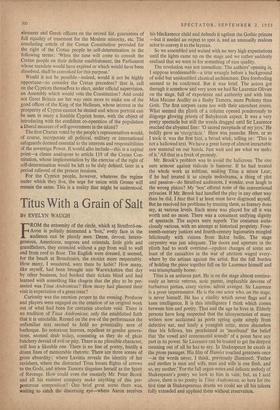Cyprus a Solution
BY A. RIZO-RANGABE* LIKE most of my countrymen. I have followed with a poignant sense of foreboding the increasing tension in the traditionally close ties of Anglo-Greek friendship in the past year. I simply cannot believe that an amicable settle- ment of the Cyprus issue that would satisfy the essential requirements of both countries is beyond the reach of the statesmanship of their leaders. And fortunately there is a precedent of great historical importance, which bears a striking similarity to the problem with which they are now concerned.
I am referring to the case of the other big island in the Eastern Mediterranean fifty years ago : Crete. Crete, with its unique Suda Bay anchorage, then of paramount strategical importance, was an autonomous island under the nominal suzerainty of the Sultan. Sovereignty was in the hands of the four 'Protecting Powers,' whose troops jointly occupied the island since the evacuation by the Turkish army six years earlier. As in Cyprus now, the population in Crete consisted of a large Greek majority and a Turkish minority. In 1905 a revolt, sheltering under the enosis flag, had broken out. When, in 1906, Prince George of Greece, the first High Com- missioner, left the island, internal disaffection was rampant. Armed bands, ready to march, occupied the hills overlooking the capital, where a combined force of international troops was stationed. A state of emergency and martial law had been proclaimed by the occupying powers. In the capital, military courts acting in the name of their respective governments— with the sole exception of the British—were summarily pass- ing sentences of extreme severity by the dozen. The prisons were filled with persons more often than not condemned on a mere suspicion. The position in the island had become explosive. Repressive measures by the military only served still further to exacerbate passions. There was at this juncture but one voice, the voice of the mother country, that could find an echo in the hearts of the Cretans. .
Then, as already stated, on the initiative of Great Britain, the four protecting powers agreed to notify King George I of Greece, on August 14, 1906, that 'in order to recognise in a practical manner the interest which HM The King of the Hellenes must always take in the prosperity of Crete,' they assigned to him the right and asked him to propose to them for appointment the person of the High Commissioner in Crete. The King's choice fell on Mr. Zaimis, a former Prime Minister. I was appointed his Secretary; thence the source of my information. The intervention of the King proved the deus ex machina! Thanks to the authority that attached to his investment by the King of Greece, Zaimis soon succeeded in bringing general appeasement and a truce between hitherto warring political parties. Through the British Consul-General, the High Commissioner was keeping in close touch with the Under-Secretary of State at the FO, Sir Charles (later Lord) Hardinge, and in the space of a few months contrived to get the Assembly, elected for this very purpose, to vote a new liberal constitution. This incorporated measures demanded by the protecting powers, such as the reorganisation of the gen- darmerie, the formation of a militia with Cretan and Greek
* Formerly Greek Ambassador in London.
elements and Greek officers on the retired list, guarantees of full equality of treatment for the Moslem minority, etc. The concluding article of the Cretan Constitution provided for the right of the Cretan people to self-determination in the following terms : `When the time will come to consult the Cretan people on their definite establishment, the Parliament whose mandate would have expired or which would have been dissolved, shall be convoked for this purpose.'
Would it not be possible—indeed, would it not be highly opportune—to consider the Cretan precedent? that is, call on the Cypriots themserves to elect, under official supervision, an Assembly which would vote the Constitution? And could not Great Britain see her way once more to make use of the good offices of the King of the Hellenes, whose interest in the prosperity of Cyprus cannot be denied and whose portrait can be seen in many a humble Cypriot home, with the object of introducing with the confident co-operation of the population a liberal measure of self-government in the island?
The first Charter voted by the people's representatives would, of course, incorporate all political, military or international safeguards deemed essential to the interests and responsibilities of the sovereign Power. It would also include—this is a capital point—a clause analogous to article 119 of the Cretan Con- stitution, whose implementation by the exercise of the right of self-determination would be left to be duly defined, later in a period relieved of the present tensions.
For the Cypriot people, however, whatever the regime under which they live, the urge for union with Greece will remain the same. This is a reality that might be understood.



































 Previous page
Previous page